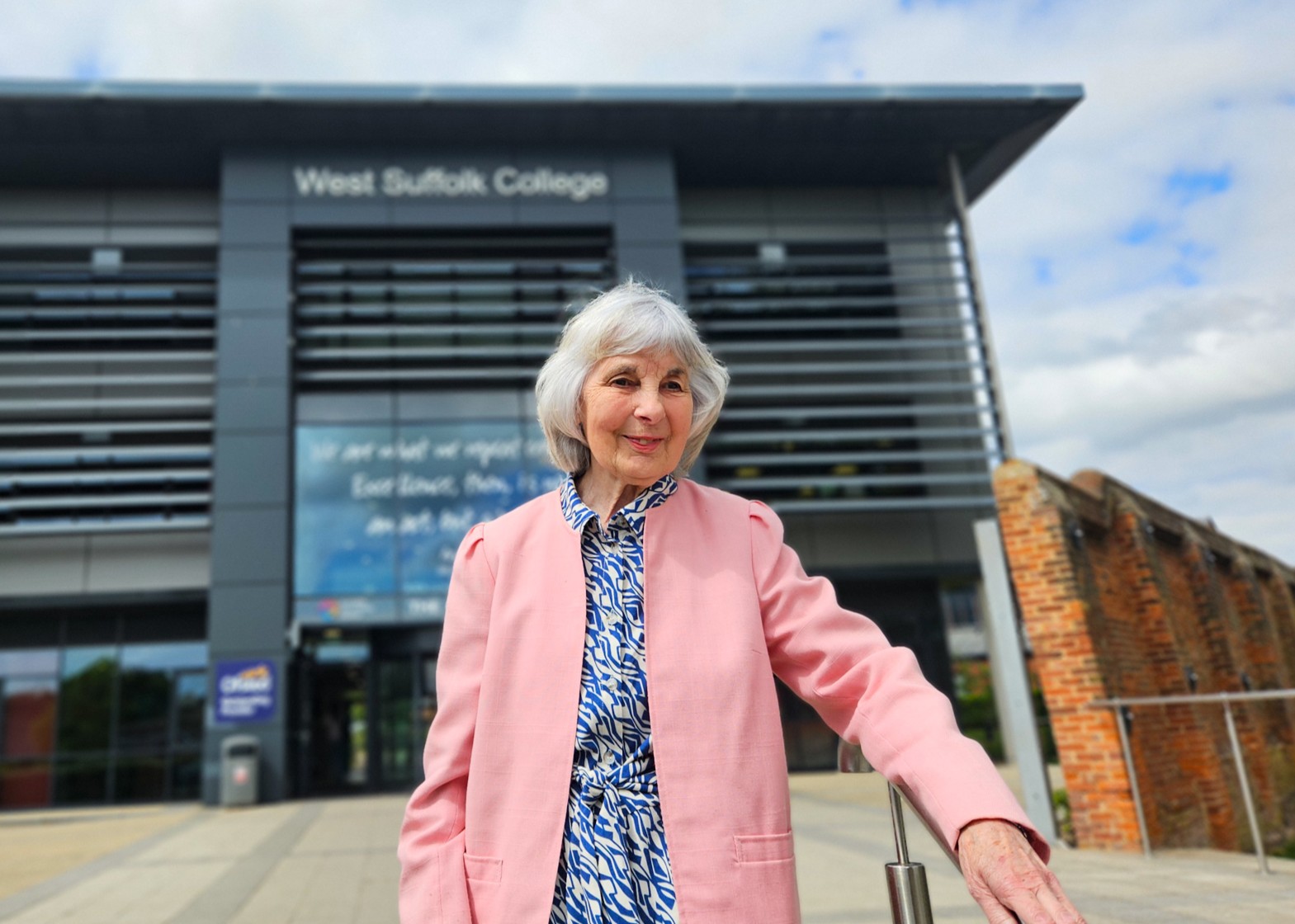80-year-old lifelong learner celebrates six decades of learning with West Suffolk College: “Don’t ever think it’s too late”
At 80 years old, Margaret is living proof that it’s never too late to learn – and that education can be a lifelong companion. Her journey with West Suffolk College began in 1960 when she enrolled as a student, and over the next six decades, she maintained a remarkable connection with the College. From studying and temping in administrative roles to regularly visiting as a client of the Hair and Beauty department, Margaret has been part of the College community in every decade up to 2020. Now, in the College’s centenary year, she returns once more to tell her story, and to share a message with the learners of the next generation: “Don’t ever think it’s too late. There’s always something new to learn, and people here will help you.”
A new beginning in Bury St Edmunds
Margaret’s connection with Bury began in 1960, when she moved to the town for a job. At the time, she didn’t know a soul and lived alone in a bedsit. Seeking something to fill her evenings, she turned to West Suffolk College, having recently evolved from its former name: ‘Bury St Edmunds Technical Institute’.
“I didn’t know anybody here, so I thought, what am I going to do with my evenings? So, I came to the college,” Margaret recalled. She ended up joining five different evening classes to stay busy, setting in motion a lifelong relationship with adult education.
Though she eventually married a Bury local in 1963, it was her job that initially brought her to the town. She worked for a company that had recently become part of the Associated British Malters (ABM), a newly formed amalgamation of maltings from Ipswich. Remarkably, the company funded evening classes for staff to improve their shorthand and typing – an unusual perk at the time. “Each time we improved and got our certificate, improved our speeds, we got a pay rise,” Margaret remembered. “When I first joined, they said you’d get paid £4.50 a week in Ipswich. But they warned us that they mustn’t expect that in Bury. In Bury, you’d get £4.” Pay rates, she explained, were different from town to town: “It was more expensive to shop in Bury than in Chelsea!”
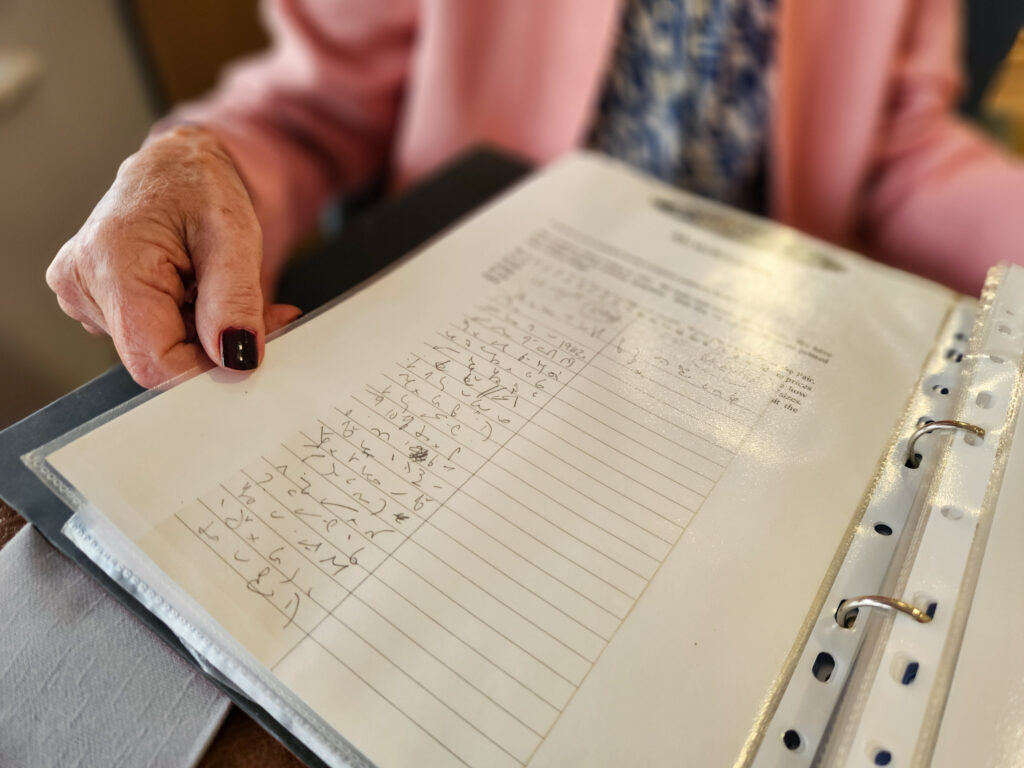
“Learning helped me find myself again.”
West Suffolk College was located where it still stands today, though it looked very different to the sprawling campus it has since grown into. “There were no other buildings. It was just the one building,” she said. One of her most vivid memories involved attending an evening class on the top floor and feeling the building sway. “The tutor noticed and said we need to report that. They told us it was perfectly all right and that it was meant to. But we weren’t so sure!”
Margaret’s dedication to self-improvement never waned. After leaving school at 15, she had taken a commercial course in shorthand and typing, but later on, after having her children, she returned to education to refresh her skills. “I feel I had to come back into things, because I’d just been literally bringing up the children. Learning helped me find myself again.” she said. So she sat her O-levels in English Language and Literature at a local grammar school affiliated with West Suffolk College.
Breaking new ground with West Suffolk College’s first NVQs
One of Margaret’s proudest accomplishments came in the late 1980s when she took part in one of West Suffolk College’s first NVQ programs in Business and Administration. She was initially hesitant, especially about the computer element. “The company I worked for didn’t even have computers,” she admitted. “I thought all these other girls, they’d know far more than me.” But her shorthand skills, which many younger students were less familiar with, enabled her to complete all 11 sections of the NVQ, including the optional shorthand unit.
Her hard work paid off. Once she completed the NVQ, Margaret was accepted into the Institute of Private Secretaries and Administrators, earning letters after her name, and was even used as a case study to promote the course.
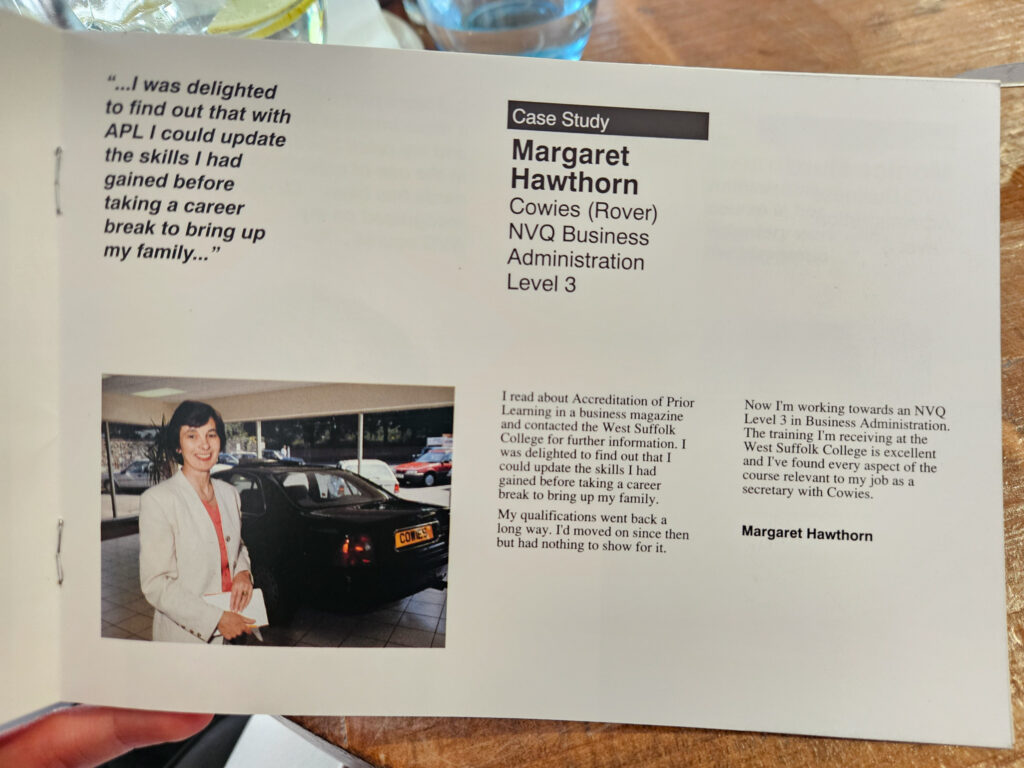
Learning through every chapter of life
Over the decades, Margaret took part in a wide range of classes at the college – art, flower arranging, even acting as a client for hairdressing students. In the 1980s, she attended a maths class to understand metric measurements after the UK’s move to decimal and metric systems. “I’ve always wanted to keep moving on, and I’ve tried to keep up with everything.” she said.
What made West Suffolk College special to her was its inclusivity and community spirit. “It caters for everybody, young and old. I was young to begin with, and then I got older, and I thought I might be past it, but then there were other older people coming.”
The atmosphere of the classes was always positive. “We were all there because we wanted to be,” she said. “It’s not like school, where you’ve got to be there. You wanted to learn. It kept your mind going and gave you confidence. Even if it’s just one class, it makes you feel part of something.”
“College gave me everything I needed”
In the 1990s, after spending 16 years at a Rover dealership, Margaret found herself at a turning point. “When the Germans took over Rover, I thought, ‘Now what am I going to do?’” she recalled. Sixteen years in one place, evolving with the job, had rooted her deeply. But when that chapter closed, she decided to temp. “That way I’d get to know different computers, meet different people, and see what I really wanted to do.”
One of those temp jobs brought her back to the College once more, where she worked as a secretary. Asked if she would return to the college now for a course, Margaret chuckled. “I think I’ve had enough now. The college provided me with everything I needed. Socially, I made friends, educationally, I learned so much, along with all my hobbies. I still do flower arranging and embroidery,” she added, with the hobby beginning at none other than West Suffolk College. “I just think all my hobbies that I’ve learnt from college, I can still do them now, you know. I’ve mastered them.”
Returning to the college after COVID was a poignant moment. She had hoped the hairdressing service might still be open to the public – “but it wasn’t, so that was the end of my time at college. Until today.” Being back, she admitted, brought joy. “I like being with the young people. You see things in a different light, and you learn from them, too.”
She spoke fondly of her husband, who had passed away two years earlier. “I miss talking about politics,” she said, and explained that she misses the intellectual companionship. “That’s something you get at college too – talking with others, seeing their point of view.”
Keeping pace with a changing world
Reflecting on the time she took off to raise her three children, Margaret remembered stopping work in 1965. Her last child was born in 1971, and by 1976, once he was in school, she began returning to work. “When I first came back, we were still using ordinary typewriters,” she recalled. Then came electric typewriters, and before long, the transition to computers began. “The machines were huge,” she remembered. She also recalls being at the College when she was introduced to email for the first time. “We had a row of computers in the classroom, and I sent an email to someone at the other end. I couldn’t believe it. I sent a message and she got it at the other end with no word of mouth!”
Looking through old photos and prospectuses, she felt part of that evolving history. “I’ve had a lot to do with the college, in different aspects,” she said. One milestone was completing the NVQ. “We were guinea pigs, really. No one knew how it would turn out.” She kept thick files for each of the 11 sections – meticulously documenting her progress.
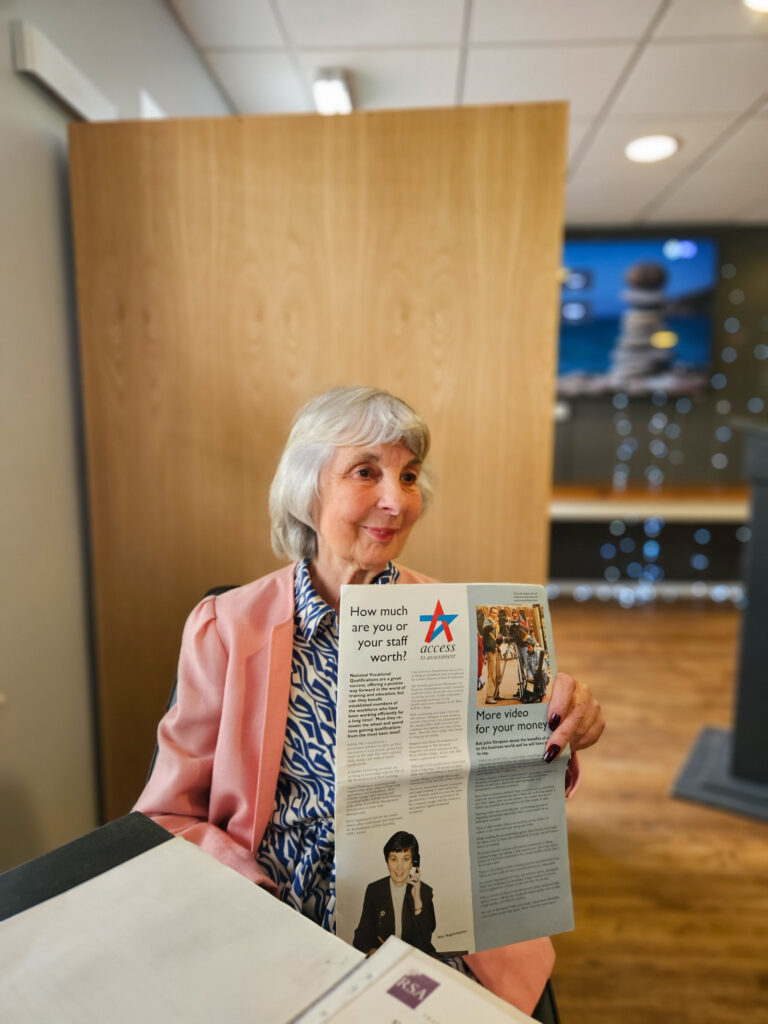
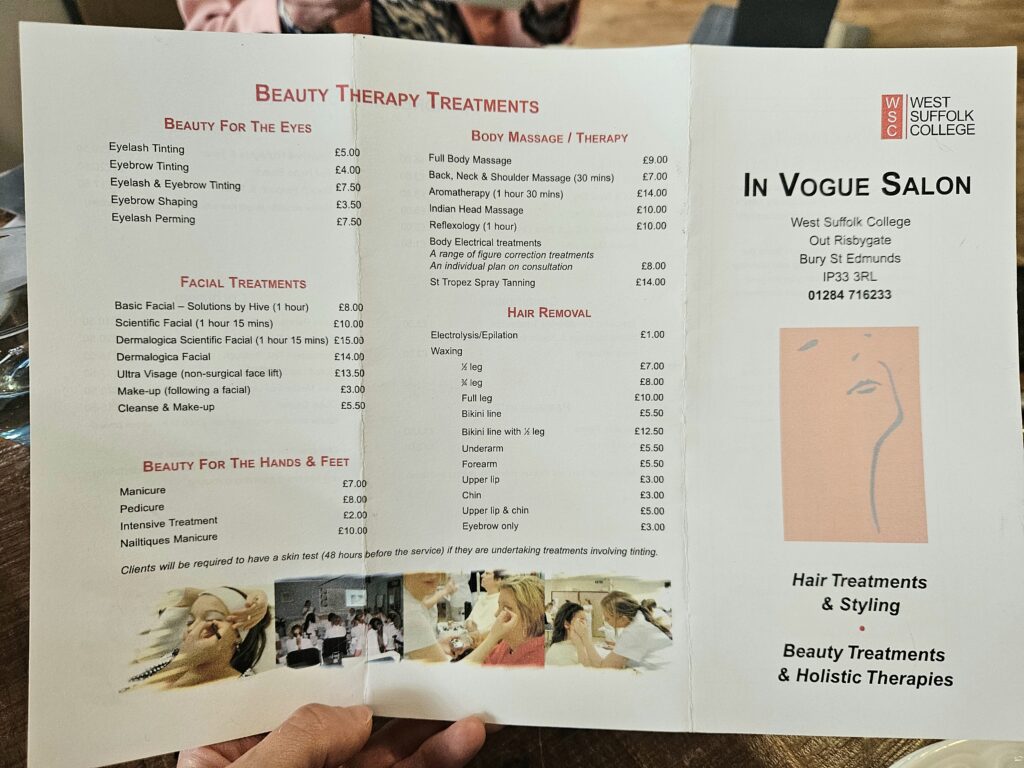
A lifetime of learning
Her last official work with the college was in the 90s, in the staffroom office. She worked as secretary to the manager overseeing the teaching staff, while also working under Ann Williams, who went on to become the sixth principal of the College.
She’d seen the place evolve – from evening classes in the 60s, to a college full of new technology. Looking back, Margaret’s journey through work, family, and education is tightly woven with the life of the college. “The whole thing’s marvellous. You never stop learning. You might think you’re finished, but something always comes along to spark your curiosity again.”
“You see the world changing, and you’ve got to keep up. You can’t be afraid of the new things; that’s what keeps your mind active.”
From her early days alone in Bury to earning post-nominals and embracing new technologies, Margaret’s story proves that education is not just for the young; it’s for the determined.

